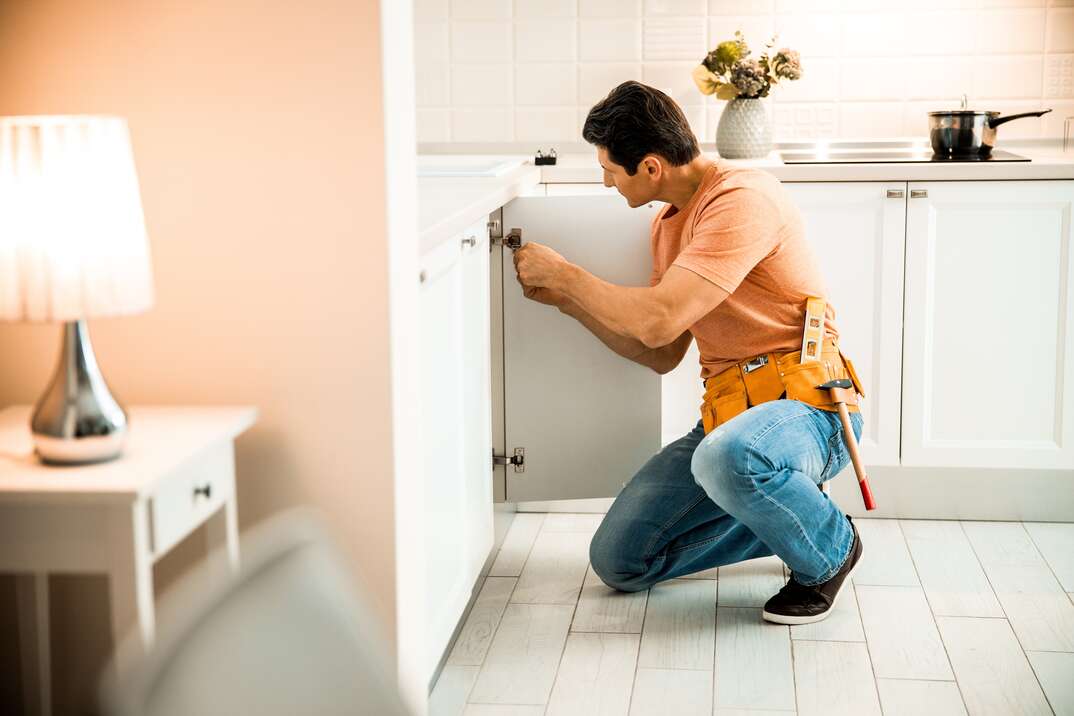- AppliancesElectriciansHVACLandscapingLocksmithPest ControlPlumbingRenovationRoofingT V RepairAll Home Improvement
- Car AccidentClass ActionCorporate LawCriminal DefenseDivorce LawEmployment LawFamily LawFinancial LawLegal AidMedical Injury LawyersMedical MalpracticeReal Estate LawWater Fire RestorationAll Legal
- InvestmentRetirementAll Finance
- Animal InsuranceAutoGeneral InsuranceHealth PolicyHome RentersAll Insurance
- DentalHealth SpecialistsAll Medical
- Animal CareVeterinaryAll Pets
- Auto GlassTowingAll Automotive
Should You Hire a Contractor or a Handyman for Your Project?

If your home needs work, you may be weighing the merits of a handyman versus a contractor. While it may be necessary to hire a licensed contractor for large or complicated projects, handymen often have diverse skill sets and can provide a wide array of services for homes and businesses.
Here we explore the types of jobs a jack-of-all-trades may perform — and when it's better to call in a specialist.
A handyman, who's sometimes referred to as a jack of all trades, is an individual who’s skilled in general repair and maintenance work but who doesn’t specialize in a specific area. Handymen typically require a mechanical aptitude, familiarity with hand and power tools and a broad knowledge of construction. Handyman businesses are typically associated with odd jobs and small commercial or residential projects.
What Type of Work Can a Handyman Do Legally?
When it comes to construction jobs, state and other local licensing requirements vary, so the type of work a handyman can legally perform may differ depending on where you live. Some regions set a maximum dollar amount for construction jobs that may be performed by handymen, while others specify the type and scope of work that may be performed.
In most states, however, handymen may legally perform minor indoor and outdoor tasks, including small repairs and home maintenance, for residential and commercial clients.
Common handyman jobs include:
- Yard cleanup
- Pressure washing
- Deck staining
- Window screen replacements
- Paint touch-ups
- Trash removal
- Trim installation
- Dry rot removal
- Furniture assembly
- Above-ground pool installation and maintenance
Occasionally, handymen may also work on larger projects that have a general contractor overseeing the work.
For extensive home improvement projects and major household repairs, hiring a general or specialty contractor may be necessary. Many states maintain strict licensing requirements for electrical and plumbing work. It’s important to hire a licensed, insured contractor for these types of jobs to avoid voiding your insurance policy and to ensure that your home or business is compliant with local building codes.
Jobs that typically require you to hire a licensed contractor include:
- Home additions and remodels
- Foundation and structural work
- Major plumbing and electrical repairs
- Asbestos abatement
- HVAC installation and repairs
- Security system installation, repair or maintenance
Why Might You Hire a Handyman Instead of a Contractor?
If you’re embarking on a major home construction or repair project such as a remodel or addition, you’ll probably need a licensed contractor, especially if permits are required. However, if you’re looking for someone to perform simple maintenance tasks, execute small home repairs or do a cleanup job, a handyman might be the better choice.
In fact, there are several compelling reasons to hire a handyman instead of a contractor:
Time Savings
Contractors often take on large projects, which means they’re sometimes booked for weeks at a time. Because handymen typically tackle smaller jobs, they may be able to get the work done sooner.
Cost Efficiency
Handymen tend to be jacks-of-all-trades, so they can competently complete a variety of household tasks. Hiring a handyman service can be a great way to complete multiple small jobs in a single day, saving you money and time.
Job Size
General contractors often prefer larger jobs and may turn down jobs they consider too small. However, many handyman businesses revolve around performing these small household tasks.
Does a Handyman Need to Be Licensed and Insured?
In many places, handymen aren’t eligible for a license. However, states such as Arkansas and Maryland require handymen to maintain a home improvement contractor’s license. Before hiring a handyman, you can find out the licensing requirements in your state by visiting your state contractor's board online. However, regardless of licensing, many handymen maintain liability insurance to protect their customers’ property in case of mishaps.
Keeping Your Home Maintained
When you own a home, little problems can quickly become big, costly problems, so whether your project requires a handyman or a contractor with expertise in a specific area, it’s important to tackle home maintenance and repair issues as they arise.
Elocal Editorial Content is for educational and entertainment purposes only. Editorial Content should not be used as a substitute for advice from a licensed professional in your state reviewing your issue. Systems, equipment, issues and circumstances vary. Follow the manufacturer's safety precautions. The opinions, beliefs and viewpoints expressed by the eLocal Editorial Team and other third-party content providers do not necessarily reflect the opinions, beliefs and viewpoints of eLocal or its affiliate companies. Use of the Blog is subject to the
Website Terms and Conditions.The eLocal Editorial Team operates independently of eLocal USA's marketing and sales decisions.



